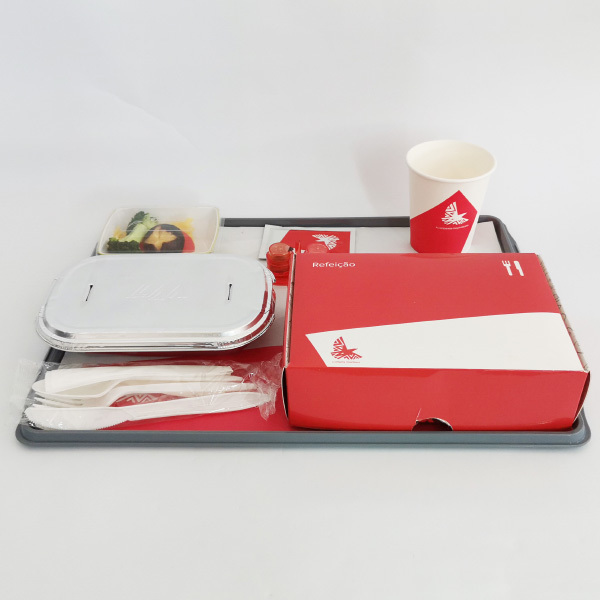Embracing Sustainability: The Benefits of Airline Biodegradable Tableware Sets
Release Time:
Jul 03,2025
In recent years, the aviation industry has faced mounting pressure to address its environmental impact, particularly concerning single-use plastics. One innovative solution that has gained traction is the use of airline biodegradable tableware sets. These sets are crafted from natural materials, designed to decompose over time, thereby minimizing waste and promoting a healthier planet.
One of the primary benefits of airline biodegradable tableware sets is their capacity to break down naturally in composting environments. Unlike traditional plastic utensils and plates, which can persist for centuries in landfills, biodegradable options typically decompose within months. This accelerated breakdown process not only reduces landfill waste but also lessens the pollution associated with plastic disposal.
Airline biodegradable tableware sets can be made from a variety of materials, including cornstarch, sugarcane fiber, and bamboo. These renewable resources offer a sustainable alternative to petroleum-based plastics, aligning with the growing demand for eco-conscious products. By utilizing these materials, airlines can significantly lessen their reliance on non-renewable resources, thereby contributing to a more circular economy.
Moreover, the implementation of biodegradable tableware can enhance the overall passenger experience. As travelers become increasingly environmentally aware, they appreciate efforts made by airlines to adopt sustainable practices. Providing biodegradable tableware not only reflects an airline's commitment to sustainability but also resonates with passengers who prioritize eco-friendly choices in their travel experiences.
In addition to improving brand image and customer satisfaction, switching to biodegradable tableware can also lead to cost savings in the long run. Though the initial investment may vary, airlines that transition to biodegradable options may benefit from reduced waste management costs and potential tax incentives associated with sustainable practices.
However, it is essential for airlines to ensure that their biodegradable tableware sets meet industry standards for biodegradability and compostability. This ensures that the products not only perform effectively during service but also break down as intended after use. By partnering with reputable suppliers and conducting thorough testing, airlines can confidently integrate these eco-friendly options into their offerings.
In conclusion, airline biodegradable tableware sets represent a forward-thinking solution to the environmental challenges faced by the aviation industry. By embracing these sustainable alternatives, airlines can significantly reduce their ecological impact while enhancing the travel experience for environmentally conscious passengers. As the movement towards sustainability continues to gain momentum, the adoption of biodegradable products will likely become a standard practice in the airline industry, paving the way for a greener future.
One of the primary benefits of airline biodegradable tableware sets is their capacity to break down naturally in composting environments. Unlike traditional plastic utensils and plates, which can persist for centuries in landfills, biodegradable options typically decompose within months. This accelerated breakdown process not only reduces landfill waste but also lessens the pollution associated with plastic disposal.
Airline biodegradable tableware sets can be made from a variety of materials, including cornstarch, sugarcane fiber, and bamboo. These renewable resources offer a sustainable alternative to petroleum-based plastics, aligning with the growing demand for eco-conscious products. By utilizing these materials, airlines can significantly lessen their reliance on non-renewable resources, thereby contributing to a more circular economy.
Moreover, the implementation of biodegradable tableware can enhance the overall passenger experience. As travelers become increasingly environmentally aware, they appreciate efforts made by airlines to adopt sustainable practices. Providing biodegradable tableware not only reflects an airline's commitment to sustainability but also resonates with passengers who prioritize eco-friendly choices in their travel experiences.
In addition to improving brand image and customer satisfaction, switching to biodegradable tableware can also lead to cost savings in the long run. Though the initial investment may vary, airlines that transition to biodegradable options may benefit from reduced waste management costs and potential tax incentives associated with sustainable practices.
However, it is essential for airlines to ensure that their biodegradable tableware sets meet industry standards for biodegradability and compostability. This ensures that the products not only perform effectively during service but also break down as intended after use. By partnering with reputable suppliers and conducting thorough testing, airlines can confidently integrate these eco-friendly options into their offerings.
In conclusion, airline biodegradable tableware sets represent a forward-thinking solution to the environmental challenges faced by the aviation industry. By embracing these sustainable alternatives, airlines can significantly reduce their ecological impact while enhancing the travel experience for environmentally conscious passengers. As the movement towards sustainability continues to gain momentum, the adoption of biodegradable products will likely become a standard practice in the airline industry, paving the way for a greener future.



